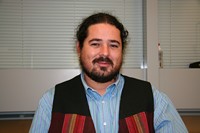 Laurentian University’s School of Engineering awarded its first PhD in Natural Resources Engineering April 15th.
Laurentian University’s School of Engineering awarded its first PhD in Natural Resources Engineering April 15th.
José Saavedra-Rosas received a degree in mathematical engineering and a Master’s in operational management from the University of Chile and began his PhD studies at McGill University in Montreal before transferring to Laurentian.
"The level of mining that you can get at McGill is highly theoretical, so I decided to come to the mining capital of Canada to get first-hand experience from miners," said Saavedra-Rosas. "I don’t regret the decision because I learned a lot about what mining really is.
"McGill is well-known for its medical school and its conservatory, but when it comes to mining, there are no mines. They do field trips to Val d’Or, an eight-hour drive from Montreal. It’s not the same as being immersed in a mining culture, which is what Sudbury and Laurentian are able to offer."
Saavedra-Rosas was attracted to Sudbury by the opportunity to conduct research at MIRARCO, a not-for-profit research firm based at Laurentian. His thesis is on the use of genetic algorithms to account for uncertainty in mine planning.
"There are several sources of uncertainty in mining," he explained. "In Sudbury, for example, we know that price uncertainty is high. There’s also geological uncertainty relating to grade because we don’t really know what’s in the ground. We only have an estimated model based on some exploration data."
Engineers who design a mine plan optimized for what they think is in the ground run the risk of going out on a limb if they are wrong, said Saavedra-Rosas. If, on the other hand, the plan is based on "some sort of compromise," it will be much better than one that is optimized for only one scenario.
"When you do this, you are actually mitigating risk. You are incorporating uncertainty into your planning process."
The methodology proposes the use of genetic algorithms to determine the number of scenarios required to arrive at a robust solution. Relying on the learning capabilities of the genetic algorithm reduces the computational cost of generating multiple scenarios in situations characterized by high levels of data uncertainty.
Saavedra-Rosas is currently a junior lecturer at the Kalgoorlie campus of the Western Australian School of Mines, whose director, Paul Dunn, was formerly an associate professor at Laurentian, director of MIRARCO’s Centre for Mining Technology and Saavedra-Rosas’ thesis supervisor.
Saavedra-Rosas plans to pursue a career in academia.
"That’s what I love. It’s my true vocation," he said.

